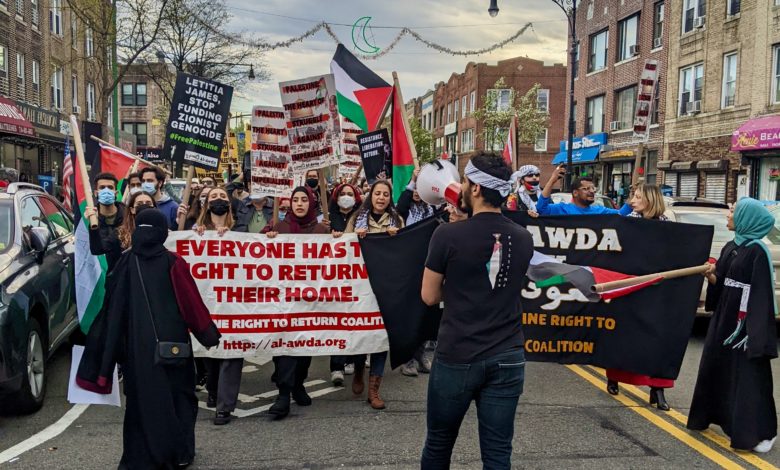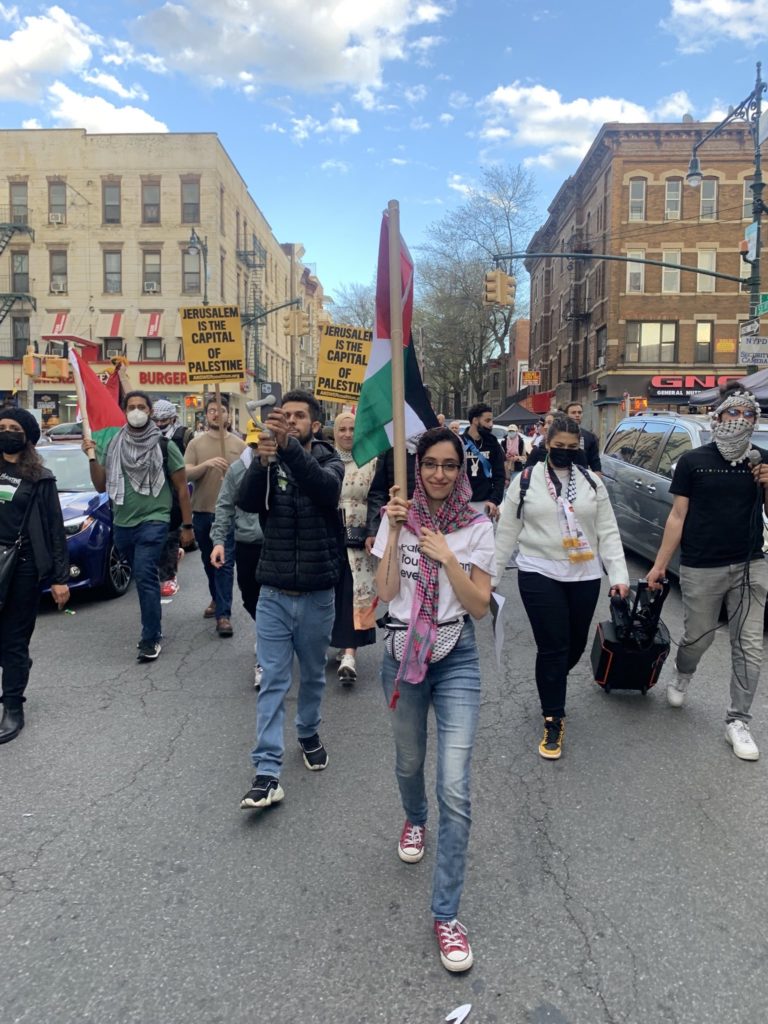
On April 16, around 60 individuals gathered in the Bay Ridge area of Brooklyn, NY, to protest the Israel Occupation Forces’ recent attacks on Jerusalem’s Al-Aqsa Mosque, one of the holiest sites for Muslims from all over the world. The demonstration was organized by Al-Awda, a coalition mobilizing around the Palestinian right of return to their homeland. Organizers from ANSWER Coalition (Act Now to Stop War & End Racism), American Muslims for Palestine, CUNY (The City University of New York) for Palestine, Students for Justice in Palestine, and the December 12th Movement also attended and spoke at the rally. Similar demonstrations condemning Israel for the attacks were held in other U.S. cities and around the world.
The rally was followed by a march to the Muslim Community Center, where Al-Awda organized a community iftar, the meal breaking the day-long fast during Ramadan.
The protest occurred days after the IOF violently attacked Palestinian Muslims gathering for the morning prayer at Al-Aqsa Mosque during Ramadan. The soldiers fired live ammunition, tear gas, stun grenades, and sound grenades, wounding more than 150 Palestinians.
Organizers at the demonstration lamented the regularity with which such attacks occurred.
“Over 20 Palestinians—innocent Palestinians, including children—have been killed in this month alone,” Christine Yasmine Harb, an organizer with the ANSWER Coalition, reminded the crowd. “This is not an accident. This is systematic, this is a strategy, this is collective punishment … The same thing happened last year during Ramadan, and after Israel bombed Gaza and killed at least 260 innocent civilians.”
‘We cannot have Black liberation without Palestinian liberation’
Protesters at the demonstration linked Palestinian liberation to other national liberation struggles, particularly ones in the U.S., and emphasized that the former could only be achieved through international solidarity. In doing so, they explicitly named the role of the U.S. in abetting Israel’s oppression of the Palestinians.
“The true committers of war crimes are those sitting in Israel and Washington D.C,” said Roger Wareham, a member of the December 12th Movement. “Our struggle is to make clear to our communities that we cannot have Black liberation without Palestinian liberation.”
Other activists echoed the sentiment and linked police brutality in the U.S. to IOF brutality against Palestinians.
“CUNY campuses welcome IOF soldiers on campus to speak on behalf of the Zionist occupation at events!” exclaimed CUNY for Palestine organizer Musabika (last name withheld). “Some colleges, like John Jay [College of Criminal Justice], produce the next generation of cops—cops that will go on, not only to repress gatherings like the one we’re having today, but to train with Israeli Occupation Forces on how best to terrorize people!”
Musabika’s words hinted at the summer of uprisings for Black lives in 2020, which came after Minneapolis police officer Derek Chauvin’s brutal murder of George Floyd. During that summer, articles highlighting years of collaboration between the IOF and police departments in the U.S. circulated the internet, reminding the public of the importance of solidarity between Palestinians and Black Americans.

Palestinians maintain revolutionary optimism
While the protest occurred in the wake of such devastating attacks, the energy of the crowd ran high as speakers looked back on the years of fierce Palestinian resistance. Even against the odds of decades of Israeli military occupation, organizers remained determined and uncompromising in their belief of Palestinian self-determination.
“We know that the Palestinian struggle is rooted in resistance in the same way that our olive trees are rooted in our soil. We will not give up!” declared Harb. “Palestinians in Palestine and all around the world are continually fighting for our right to self-determination … If the violence in Jerusalem escalates, our resistance, our organizing, and our revolutionary optimism has to escalate as well. We will free Palestine.”






